The world of foreign policy can be noisy. In this interview, Anthony Wier, who leads FCNL’s work on nuclear disarmament, explains how the quiet, behind-the-scenes work done by grassroots FCNL Advocacy Teams cuts through the noise on Capitol Hill.
This interview has been edited for length and clarity.
What impact have citizen advocates had in promoting peace with North Korea?
One of the greatest values I see in the community-building work done by FCNL’s Advocacy Teams is that we are making a conscious decision to stay focused on a single topic for a long time, even when it’s out of the headlines.
The reality is, when it comes to foreign policy decisions, the stakes are often not immediately clear for the average American citizen. Our members of Congress don’t hear about North Korea from their constituents. When engaged citizens are saying, ‘I care about this. I’m going to the trouble of telling you I want you to act in this way,’ that stands out.”
What is FCNL’s unique role in promoting peace with North Korea?
For me, the relationship-based approach to citizen activism has a unique value in a noisy time. I find that our silence can actually carry a lot of volume when it comes to influencing policymakers. For members of Congress, meeting with us is a more pleasant experience than being yelled at in a town hall meeting.
Ultimately, we are facing this classic division between the urgent and the important. Every day we are inundated by information designed to influence our behavior, so we live in a world where everything feels urgent. With FCNL’s Advocacy Teams model, we are helping people make sure they are continuing to spend time on the important.
We live in this time of anger and rage, and that can blind you to another person’s point of view. The impulse today is to talk louder, to rise above the noise. To me, that’s an arms race that never ends. The only antidote I can come up with is more listening.
This year, FCNL’s Advocacy Teams are lobbying on two pieces of legislation, S. 2047 and H.R. 4837. Why these bills?
These are among the few pieces of legislation that do two things: state clear support for a peaceful resolution to the conflict, and call for diplomacy as a means to resolve it. FCNL will always oppose war, and we have confidence that, in the case of North Korea, the American voter, given time and reflection, will oppose it as well.
These bills would reassert what should be obvious from our constitution, but in practice has been routinely ignored by the wielders of U.S. power: It has to be the 535 direct representatives of the people who should decide if the nation chooses war, not one person subject to reelection only once. It puts faith where we think faith should lie – with the American people.
Why is the Quaker approach important at this moment?
The most important element is the Quaker conviction that there is that of God in every person.
When it comes to the Korean Peninsula, we sometimes see an ugly, deep vein of racist dismissal against the suffering and loss faced by Korean families in this conflict. As Quakers, we believe that when choosing policies, you have to recognize the implications for all people – including North Koreans.
A Quaker approach carries a habit of gentleness. We live in this time of anger and rage, and that can blind you to another person’s point of view. The impulse today is to talk louder, to rise above the noise. To me, that’s an arms race that never ends. The only antidote I can come up with is more listening.

